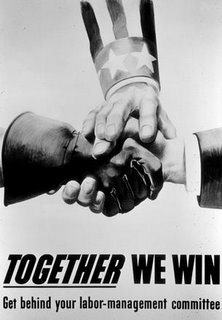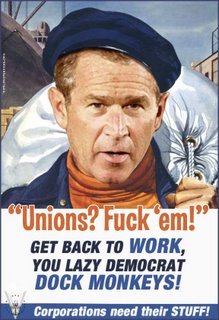 Workers (or, Labor), that is, those who produce something for a living, are never inclined to work hard (shut up right now about work ethics, okay), because the harder they work, the less money they make for that work (in effect). Ever have a Rush Job? You have to bust your butt to get the job out the door, right? And while the company may get a substantially larger amount of money to do the job in a short amount of time, because you take less time to do the job, you actually get paid less money to do that job than you would for an ordinary one.
Workers (or, Labor), that is, those who produce something for a living, are never inclined to work hard (shut up right now about work ethics, okay), because the harder they work, the less money they make for that work (in effect). Ever have a Rush Job? You have to bust your butt to get the job out the door, right? And while the company may get a substantially larger amount of money to do the job in a short amount of time, because you take less time to do the job, you actually get paid less money to do that job than you would for an ordinary one.Management, on the other hand, are those whose job it is to make sure that the workers do more work in less time. Management would love to live in a world where every job is a rush job. It is the function of a manager to make sure not only that you do not spend valuable "company" time not producing something for that company, but that when you are producing you are doing so as fast as you can.
This is the essence of the labor/management conflict. Workers want more for their work, which can be achieved either through raises, or through working less hard (though this doesnt necessarily increase the final amount one may earn). Managers want to maximize the amount of work done for each dollar, which is why they're such a pain in the ass to the working person.
 For most of recorded labor/management history, management has had a distinct advantage. The whip hand here (when it doesnt contain an actual whip, an event far too frequent in the past) is unemployment. There are almost always more workers than jobs, and this is the stick that management has been able to use to compensate for the rather paltry (frequently half-eaten and moldy) carrot it dangles before those it employs. There are exceptions, of course. The period after the Black Death ravaged Europe was said to be a particularly good time to be a peasant, assuming you had survived.
For most of recorded labor/management history, management has had a distinct advantage. The whip hand here (when it doesnt contain an actual whip, an event far too frequent in the past) is unemployment. There are almost always more workers than jobs, and this is the stick that management has been able to use to compensate for the rather paltry (frequently half-eaten and moldy) carrot it dangles before those it employs. There are exceptions, of course. The period after the Black Death ravaged Europe was said to be a particularly good time to be a peasant, assuming you had survived.This was where Unions came in. While a company could easily survive the loss of one or two trouble-makering workers (asking for more money, I mean, seriously!) It found it much harder to survive the loss of all of its workers, especially when any one wishing to replace those workers must pass through a crowd of them in order to do so. Management, of course, hated this, because it got in the way of their job, which was to give workers as little money as possible while getting them to produce as much as possible.
If you want a possible answer as to why Union membership in the U.S. has declined, perhaps viewing the roll of unions within this context will help. For instance, take this story about a Plumbers Union in Philadelphia. They are upset because of plans to install no-flush toilets in a new office building. No-Flush means no plumbers, unless something clogs. That means half of the income normally associated with a urinal is now, forgive me, down the toilet.
Well, boo-fucking-hoo. First of all, lets get something straight. It's not really a Union. It's a Guild. Guilds are much older than unions, and they were created, not to protect the workers from exploitation, but to maximize the income of the guilds (which, I suppose, is okay, but that's not my point right now). Interestingly enough, a lot of guilds were created after the Black Death.
When a Plumber works on an office building under construction, that's when he is in a Union, because then the labor/management function kicks in: Guys in charge of building want to spend less and have Big Money on their side, guys doing the actual work of building want more and have the Union on their side. When a plumber comes to your house (or office building), and charges you $200 for 15 minutes worth of pipe-snaking, that's a Guild.
Maybe if Unions want to regain their stature in America, they need to concentrate more on the protecting Labor From Management side of things, and less on the Maximizing Guild-Members Profits side. Ordinary people (i.e., those who produce things) can sympathise with workers wanting to be paid more (see genuine government numbers here), but not when it appears to be avarice getting in the way of common sense. Blocking the installation of no-flush toilets because you dont want to lose potential income from fixing them would, I think, qualify here.
America's Unions dont have a membership problem. They have an image problem. The primary function of today's Unions seems to be the making of unreasonable demands and the protection of useless workers. Meanwhile, all over the country, the rights, wages, and stability of most workers continues to slip, without much comment from the unions aside from, "If you joined us, things would be better" ("feel the power of the Dark Side!").
 Lets face it. American Unions have gone the way of all organizations. They got large, formed a hierarcy, and developed a bureaucracy. Once the top was insulated from the bottom, they lost touch with those they were supposed to be serving, while the bottom ceased to even care about the organization (except for what it could get out of it). It's coasting now on its momentum, but momentum fades. Short of a major shake-up (a Union Reformation, if you will) it will someday stop.
Lets face it. American Unions have gone the way of all organizations. They got large, formed a hierarcy, and developed a bureaucracy. Once the top was insulated from the bottom, they lost touch with those they were supposed to be serving, while the bottom ceased to even care about the organization (except for what it could get out of it). It's coasting now on its momentum, but momentum fades. Short of a major shake-up (a Union Reformation, if you will) it will someday stop.Meanwhile, if you produce something for a living, expect your life to get worse before it gets better. Hopefully, something will come along to take the empty place at our side once occupied by unions, and it will do it before Management gets their hand on any real whips.
Using the above model, a question occurs to me. What is the function of a CEO, and other tip-top brass? I mean, in the one sense, they could be considered to be the acme of Management, those whose job it is to make all others produce more.
But maybe that's the wrong way to look at it. Let's (despite my "black/white" scree of the other day) break it down to absolute basics again. A CEO is suppose to produce profits for Stockholders (management). If the stockholders were doing their job correctly, they would be trying to pay the CEO as little as possible to get the job done.
Do they seem like they're doing that to you?



5 comments:
Dave,
That's one of the most lucid expositions of Unions I've ever read. Definitely the only one to ever use "Boo Fucking Hoo".
Very good. I agree completely.
I'm not sure what the role of CEOs is. They, many times, don't make money for the stockholders, they aren't good for workers, and apparently are the only ones coming out of the quagmire with a profit...oh yeah, and they work less too.
So I guess I answered my own question. The role of CEOs is to commit leagalized economic gang rape.
There really doesnt seem to be any check on the power or profit given to/used by a CEO, other than the Board of Directors. Unfortunately, these Boards are often incestuous organizations, with one CEO on the Board of another CEO, who is on his Board.
And here's something I've always been curious about: Often in hostile take-over bids, the coup d'etat will be accomplished with less than 10% of the stock bought up. How does this happen? Why can you take over a company with a percentage of shares that even a Florida Republican would think too small.
As far as "incestuous relationships" between a company's officers and it's board, there has been a fairly pronounced shift against that trend with/since the passage of the Sarbanes-Oxley Act after the Enron et al fiascos of the early century. More stringent requirements on both sides (mgmt/board) are leading to more sanity in corporate dealings. Also, there are several instances of shareholders rebelling against some of the more ridiculous compensation packages that have been given out recently. Hope is out there.
How does the Sarbanes-Oxley Act cover mutual backsratching between companies? Surely they cant prohibit it, so I'd think at best they'd say you must disclose it. But does that really stop it?
Post a Comment